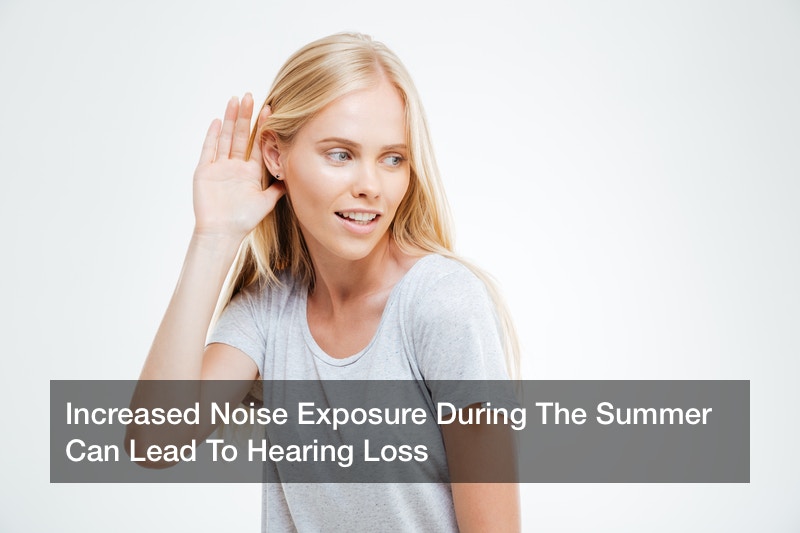
 Summer brings a plethora of joys for many families. Between summer barbecues, firework shows, and endless opportunities to see live music, your calendar quickly becomes full of the activities and events you’ve been waiting for all year long. Many of these beloved summer events, however, have one key risk in common: noise exposure.
Summer brings a plethora of joys for many families. Between summer barbecues, firework shows, and endless opportunities to see live music, your calendar quickly becomes full of the activities and events you’ve been waiting for all year long. Many of these beloved summer events, however, have one key risk in common: noise exposure.
According to hearing instrument specialist Okie Allen, too much noise exposure can result in long-term damage to a person’s hearing. Hearing specialists often advise the public to think about this exposure more acutely in the summer.
Not only does this season carry increased noise exposure from concerts and fireworks, but everyday noise sources such as lawn mowers and road construction are also much more prevalent in the summertime than in the year’s other seasons. In general, about 15% of American adults report some trouble hearing, and 26 million Americans over the age of 20 have high-frequency hearing loss as a result of loud noise exposure. Allen says that a person’s auditory nerves will first become tired, resulting in tinnitus, or ringing in the ears. This ringing is typically the first sign of hearing loss.
“Over a period of time, the constant exposure causes what they call acoustic trauma,” said Allen.
Recent studies have demonstrated that approximately 12.5% or 5.2 million children experience hearing loss because of noise exposure, according to Ball State University. For perspective, this percentage is higher than the 5.4% of children who suffer from food allergies as well as the 11.6% who have skin allergies. While some degree of hearing loss is almost inevitable with age, developing it as a child is rarely a natural process.
Luckily, there are steps you can take to protect your hearing and that of your children, particularly during the summer. The first step is to know the signs of exposure to hazardous noise and seek medical attention if you can identify the signs in yourself or a loved one. While you won’t necessarily need to go to the emergency room of one of the 6,210 hospitals in the U.S. right away, you should schedule an appointment with your family doctor as soon as possible. They may then send you to an audiologist for further examination. The signs you should keep an eye (and an ear) out for are:
- You experience pain or ringing in your ears immediately following the exposure
- Speech around you sounds as if it is muffled
- You are unable to understand someone speaking two feet away
- Others must raise their voices for you to understand them
As audiologist Lynn Bielski says that new research has revealed that symptoms such as these typically indicate that irreversible damage has already been done to the auditory system, the actions you should take this summer should focus on preventing hearing loss from happening in the first place. Wearing earplugs during any event that involves louder-than-average noise exposure is essential in preserving your hearing.
For those who love concerts and music festivals, investing in custom earplugs may be worth the cost. As they are perfectly molded to the wearer’s ear, they guarantee maximum protection and are easier to wear than the average pair. With the U.S. Centers for Disease Control estimating that almost 15% of the general public experiences some form of tinnitus, paying the $250 for custom earplugs may be a relatively small price to pay to avoid becoming part of this statistic. However, if you don’t want to pay this price tag for custom earplugs, generic ones from any pharmacy are still effective at reducing noise levels by about 30 decibels and cost only a few dollars.
To further protect your hearing, be sure that you stay at least 25 feet away from the speakers that are playing the music. Even if you’re wearing earplugs, you should still remember to take breaks from exposure to noise. By staying exposed to loud noise for long periods of time, you increase your risk for hearing loss.
While you’re enjoying your summer activities this season, stay mindful of the health of your hearing. Whether you’re going for a swim, jamming out at a concert, or even just moving homes during the summer, which is when half of all moves take place, you’re exposing your auditory system to stressful conditions. By keeping a pair of earplugs with you at all times and putting the other preventative practices into action, you’ll be able to get through all of these activities and much more with your hearing unscathed. Doesn’t that sound great?



